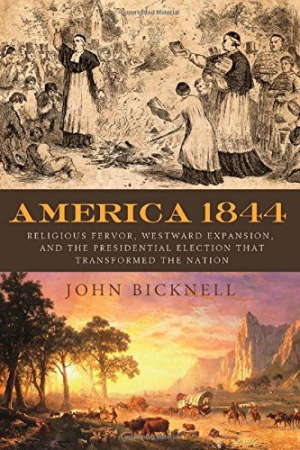America 1844
Religious Ferver, Westward Expansion, and the Presidential Election That Transformed the Nation
Bicknell’s holistic analysis of 1844 America shows how much the nation has changed—and how much it hasn’t.
After reading John Bicknell’s new history about the United States in the mid-19th century, one comes away with the feeling that, absent territorial expansion, things haven’t changed all that much in the intervening years. There’s still cultural fanaticism and xenophobia, political discord, and technological innovations that transform the way we live and communicate.
America 1844 jumps back and forth from a contentious presidential race to ironic religious intolerance, westward movement, and world-altering inventions such as “advanced weaponry” and Samuel Morse’s telegraph. While Morse’s creation contributed to “the annihilation of time and space” (much as today’s Internet and social media), it was just one of the means to push the United States along the road of progress. “The burgeoning manufacturing economy was creating opportunity for thousands to improve their lot,” Bicknell writes. “Better farming technologies meant more food. Better printing techniques made newspapers available to wider audiences. The railroad … gave both manufacturers and farmers expanded outlets for their products.”
Compared with these advancements, change in politics has been practically immobile. Negative campaigning isn’t new, it’s just “improved,” thanks to enhanced methods of communications. Even in 1844, people complained about disappointing outcomes. “My country! Oh, My country!” Bicknell relays from a prominent businessman dismayed by the election of James K. Polk to the nation’s top office. It is a sentiment reiterated for decades by supporters of their favored—defeated—candidates.
Bicknell, whose political credentials include writing and editing for Congressional Quarterly, Roll Call, and Politics in America, is at his best when he describes the harrowing journey of Americans seeking what they hope will be a better life out west, especially in Oregon. The railroads had not yet spread through the nation; the arduous treks via horse- or oxen-drawn wagons were fraught with dangers and deprivations that are not adequately portrayed in cinematic westerns. The annexation of Texas, on the other hand, was perhaps more contentious—and certainly a major platform in the elections—but the reader does not get a sense of the tensions of the time. Nevertheless, students of several disciplines—American history, political science, religion, etc.—will find America 1844 a fascinating rendering of a period of this nation’s continuing origin story that seems to be relatively sparse in the telling.
Reviewed by
Ron Kaplan
Disclosure: This article is not an endorsement, but a review. The publisher of this book provided free copies of the book to have their book reviewed by a professional reviewer. No fee was paid by the publisher for this review. Foreword Reviews only recommends books that we love. Foreword Magazine, Inc. is disclosing this in accordance with the Federal Trade Commission’s 16 CFR, Part 255.

